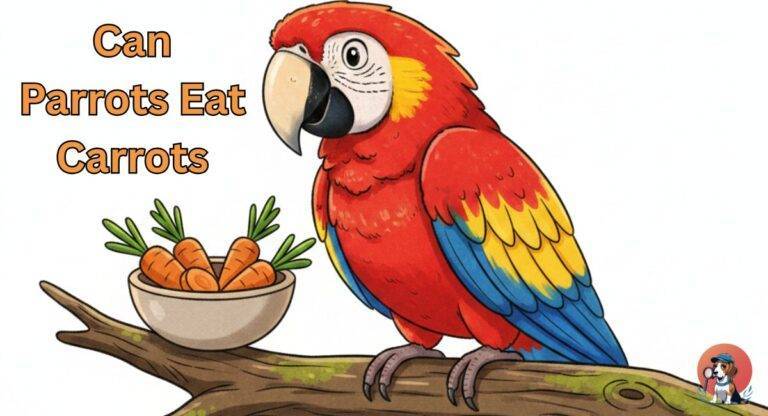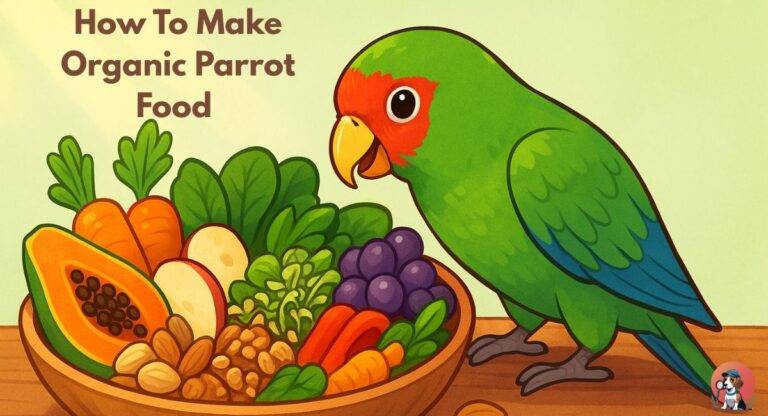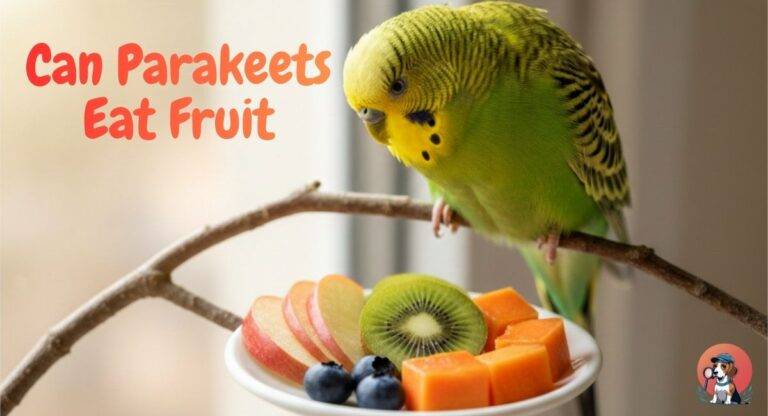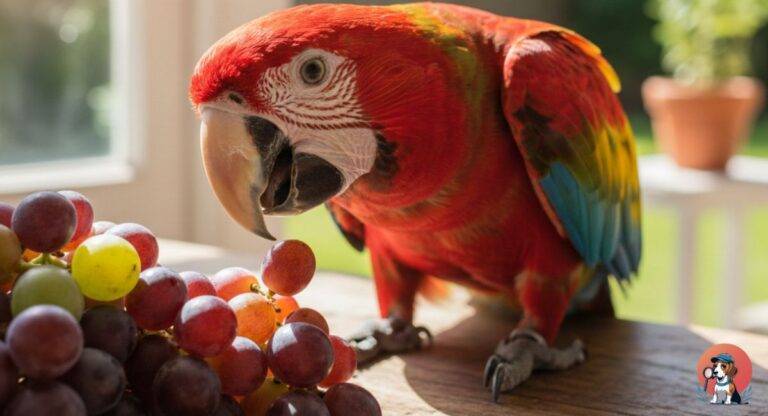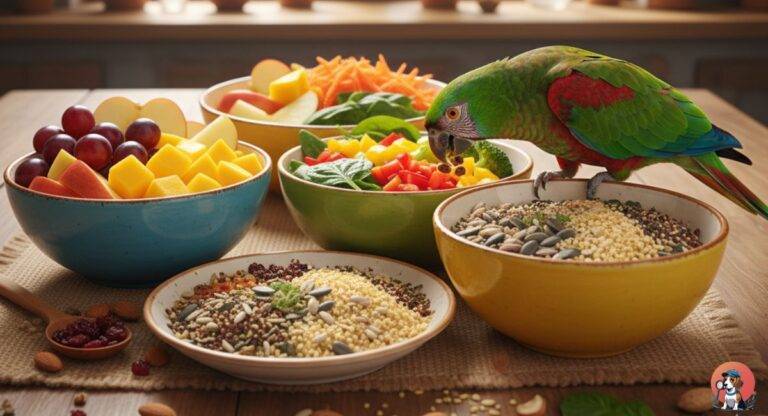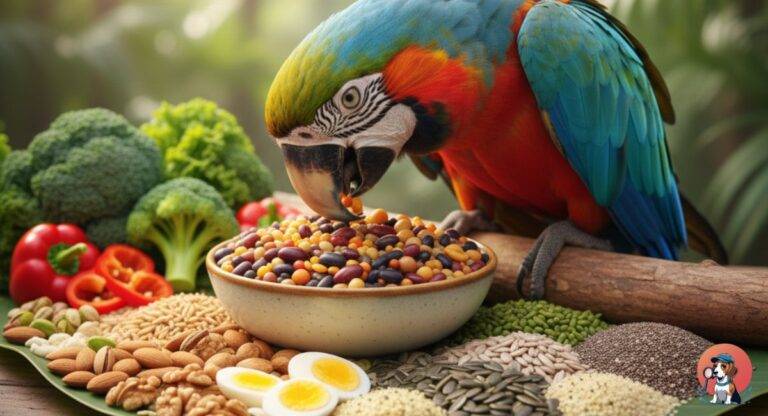A well-prepared parrot nutrition food guide helps every parrot owner provide a balanced diet that ensures long life and vibrant health. By following the parrot nutrition food guide, you understand safe options and avoid harmful choices. Many owners ask, what do parrots eat, and the answer lies within a detailed parrot nutrition food guide. Learning what do parrots eat allows owners to focus on variety, quality, and natural options. The parrot nutrition food guide creates clarity about seeds, fruits, and vegetables. When someone wonders what do parrots eat, this structured parrot nutrition food guide gives complete answers.
Understanding the importance of a parrot nutrition food guide builds a foundation for responsible pet care. Pet lovers searching what do parrots eat find exact answers through a researched parrot nutrition food guide. Birds thrive when guided by a reliable parrot nutrition food guide, which focuses on fresh produce, nuts, and grains. Owners often ask what do parrots eat when designing daily meals, and the parrot nutrition food guide ensures variety. The value of the parrot nutrition food guide is its clarity, showing what do parrots eat daily while keeping parrots safe from unhealthy items.
A clear parrot nutrition food guide becomes the ultimate tool for bird health. Many caretakers question what do parrots eat, and a parrot nutrition food guide answers with structured lists. Using the parrot nutrition food guide ensures parrots get essential vitamins, minerals, and fiber. Each section of the parrot nutrition food guide simplifies feeding while making pet care easier. Those wondering what do parrots eat discover solutions through fruits, seeds, and greens. A comprehensive parrot nutrition food guide builds confidence, showing exactly what do parrots eat while preventing nutritional mistakes.
1. Importance of a Balanced Diet for Parrots
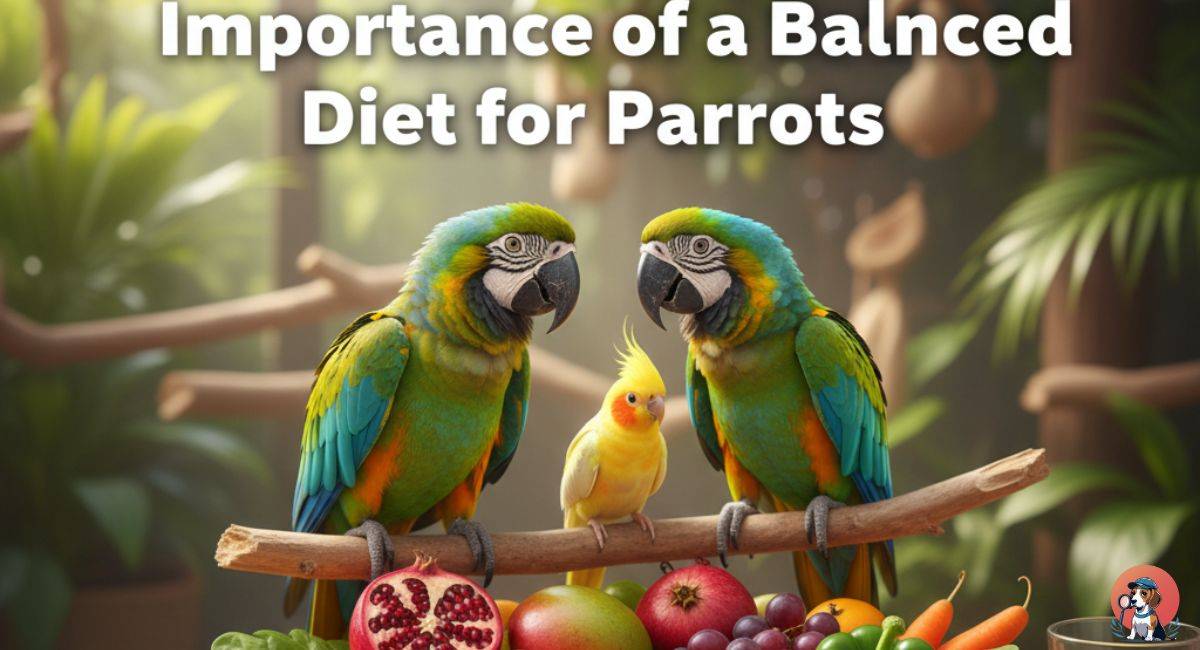 A parrot nutrition food guide always begins with balance, because parrots need variety to stay healthy and live longer. Owners often ask what do parrots eat daily, but the answer depends on mixing vegetables, fruits, pellets, and limited seeds. Without balance, parrots face obesity, weak immunity, and feather loss. Following a structured parrot nutrition food guide helps prevent health risks, encourages better behavior, and provides energy. The foundation of every feeding routine is ensuring meals are colorful, diverse, and nutrient-packed.
A parrot nutrition food guide always begins with balance, because parrots need variety to stay healthy and live longer. Owners often ask what do parrots eat daily, but the answer depends on mixing vegetables, fruits, pellets, and limited seeds. Without balance, parrots face obesity, weak immunity, and feather loss. Following a structured parrot nutrition food guide helps prevent health risks, encourages better behavior, and provides energy. The foundation of every feeding routine is ensuring meals are colorful, diverse, and nutrient-packed.
-
Fresh vegetables daily
-
Seasonal fruits
-
Quality pellets
-
Seeds in moderation
-
Vitamin supplements
-
Adequate proteins
-
Proper hydration
-
Avoiding fatty foods
-
Calcium for bones
-
Consistency in feeding
2. Fruits in the Parrot Nutrition Food Guide
Fruits are essential in a parrot nutrition food guide because they provide vitamins, antioxidants, and hydration. When people wonder what do parrots eat for glowing feathers and strong immunity, fruits are the answer. They should be fresh, seasonal, and served in small portions to minimize excess sugar. The right fruit selection prevents vitamin deficiency, boosts energy, and supports feather regrowth. Including fruits daily ensures variety in texture and taste, which makes parrots more engaged and happier during meals.
-
Apples (without seeds)
-
Bananas
-
Mangoes
-
Papaya
-
Grapes
-
Oranges
-
Berries
-
Pineapple
-
Kiwi
-
Melon
3. Vegetables in Parrot Nutrition Food Guide
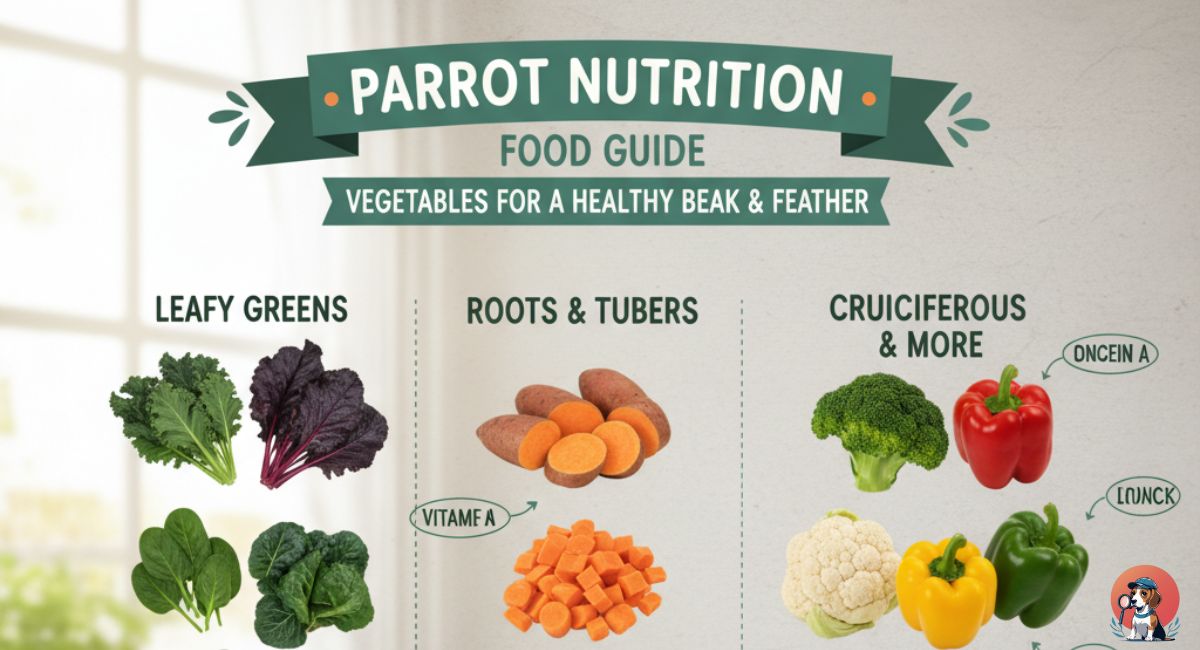 Vegetables are the backbone of the parrot nutrition food guide as they contain minerals, vitamins, and fiber. People often ask what do parrots eat for immunity, and vegetables are the number one choice. Leafy greens, roots, and colorful veggies improve digestion, strengthen bones, and provide antioxidants. Daily vegetable servings reduce the risks of malnutrition and obesity. A mix of raw and lightly steamed vegetables offers variety while keeping essential nutrients intact. Parrots thrive on green-rich meals for overall well-being.
Vegetables are the backbone of the parrot nutrition food guide as they contain minerals, vitamins, and fiber. People often ask what do parrots eat for immunity, and vegetables are the number one choice. Leafy greens, roots, and colorful veggies improve digestion, strengthen bones, and provide antioxidants. Daily vegetable servings reduce the risks of malnutrition and obesity. A mix of raw and lightly steamed vegetables offers variety while keeping essential nutrients intact. Parrots thrive on green-rich meals for overall well-being.
-
Carrots
-
Spinach
-
Kale
-
Broccoli
-
Bell peppers
-
Sweet potatoes
-
Peas
-
Corn
-
Cucumber
-
Zucchini
4. Seeds and Nuts Role
The parrot nutrition food guide acknowledges seeds and nuts as vital but limited foods. While many think seeds answer what do parrots eat, they are high in fat and cannot serve as the main diet. Seeds and nuts should be given as supplements to balanced meals, offering energy, proteins, and fatty acids. Too many seeds can cause obesity and liver problems, so moderation is essential. A wise balance ensures parrots enjoy these treats without harming long-term health.
-
Sunflower seeds
-
Pumpkin seeds
-
Flax seeds
-
Chia seeds
-
Almonds
-
Walnuts
-
Hazelnuts
-
Cashews
-
Pistachios
-
Brazil nuts
5. Importance of Pellets
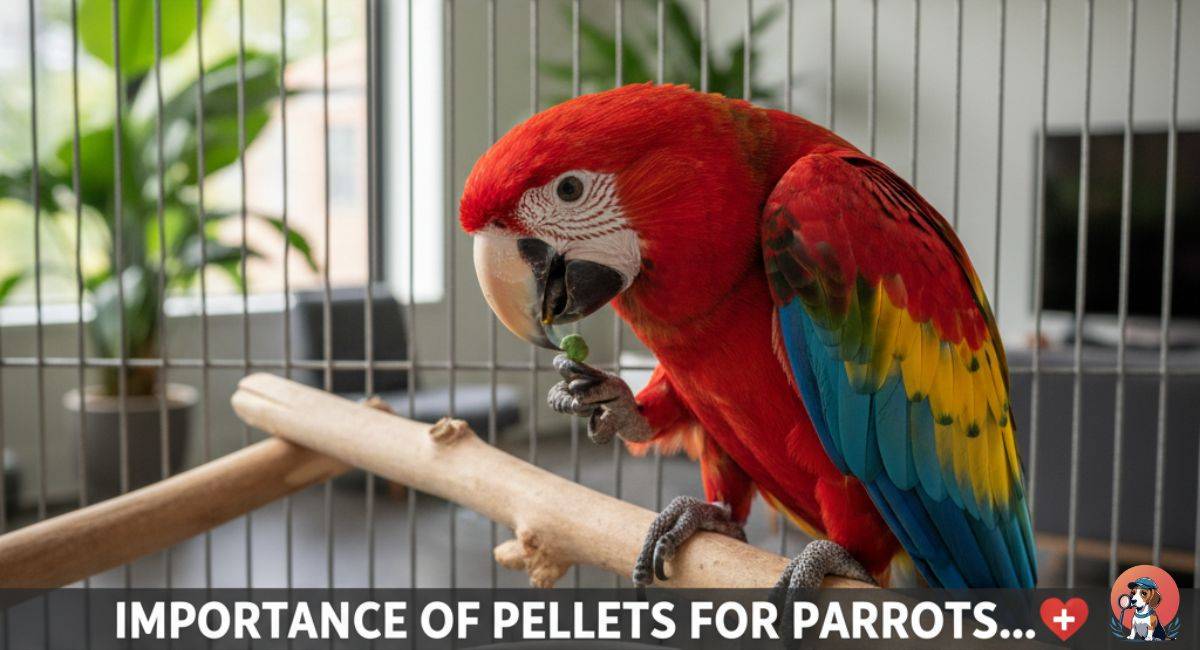 A modern parrot nutrition food guide highlights pellets as a reliable option for consistent nutrition. Owners often wonder what do parrots eat that guarantees balance without excess, and pellets provide the solution. Pellets are specially formulated to prevent deficiencies, covering proteins, vitamins, and minerals. Unlike seeds, pellets reduce picky eating habits and make portion control easy. When combined with fresh produce, pellets create a complete feeding routine. Their convenience and nutrient density make them essential for healthy parrots.
A modern parrot nutrition food guide highlights pellets as a reliable option for consistent nutrition. Owners often wonder what do parrots eat that guarantees balance without excess, and pellets provide the solution. Pellets are specially formulated to prevent deficiencies, covering proteins, vitamins, and minerals. Unlike seeds, pellets reduce picky eating habits and make portion control easy. When combined with fresh produce, pellets create a complete feeding routine. Their convenience and nutrient density make them essential for healthy parrots.
-
Balanced nutrients
-
Prevent picky eating
-
Easier portion control
-
Available in flavors
-
Long shelf life
-
Controlled fat content
-
Consistency in meals
-
Supports digestion
-
Maintains feathers
-
Reduces deficiencies
6. Hydration and Fresh Water
The parrot nutrition food guide stresses that hydration is as important as food. While owners mainly ask what do parrots eat, water is equally vital for digestion and body temperature. Parrots must always have access to clean, chemical-free water to prevent dehydration. Regularly changing water bowls ensures safety and freshness. Adding hydrating fruits can also boost fluid intake. When parrots drink enough water, they maintain higher energy, better digestion, and stronger immunity. Hydration forms the hidden pillar of parrot care.
-
Fresh daily water
-
Clean bowls
-
Change twice daily
-
Avoid tap chemicals
-
Add electrolytes if sick
-
Filtered water preferred
-
Watch for dehydration signs
-
Small sips during meals
-
Encourage fruit juices occasionally
-
Never use soda or caffeine
7. Treats in Moderation
The parrot nutrition food guide allows treats, but always stresses moderation to avoid health risks. Owners asking what do parrots eat for fun enrichment should use treats sparingly. Treats make mealtime exciting, encourage bonding, and serve as training rewards. However, sugary or fatty treats can quickly lead to obesity, poor feathers, and digestive issues. By offering small, healthy options, you can keep your parrot motivated without compromising wellness. A careful approach ensures treats add joy, not harm, to diets.
-
Dried fruits
-
Cooked grains
-
Honey sticks
-
Small bread pieces
-
Egg food
-
Low-sugar biscuits
-
Unsalted popcorn
-
Nut mixes
-
Fruit chips
-
Oatmeal
8. Harmful Foods to Avoid
A parrot nutrition food guide would be incomplete without warnings about dangerous foods. Many new owners search for what do parrots eat and unknowingly offer toxic items. Foods like chocolate, avocado, and caffeine damage the nervous system and can be fatal. Avoiding harmful ingredients is as important as choosing healthy ones. Learning which foods to avoid saves lives and prevents costly vet visits. Responsible feeding ensures parrots stay safe, energetic, and disease-free throughout their lives. Prevention begins with awareness.
-
Chocolate
-
Avocado
-
Onions
-
Garlic
-
Alcohol
-
Caffeine
-
Salty snacks
-
Sugary items
-
Fried foods
-
Processed meats
9. Feeding Routine for Parrots
The parrot nutrition food guide always emphasizes routine because parrots thrive on structure. When asking what do parrots eat at different times, owners must follow a consistent feeding schedule. Regular timing prevents overeating, picky habits, and stress. Dividing meals into morning, afternoon, and evening keeps birds energized throughout the day. Observing eating patterns also helps detect illness early. A steady daily routine reflects care and discipline, ensuring parrots feel secure, satisfied, and well-nourished at all times.
-
Morning fresh meals
-
Afternoon snacks
-
Evening pellets
-
Treats between meals
-
Clean bowls daily
-
Observe eating habits
-
Adjust portions
-
Seasonal adjustments
-
Monitor waste for health
-
Avoid late-night feeding
10. Seasonal Adjustments in Diet
A proper parrot nutrition food guide changes with the seasons to match natural needs. People asking what do parrots eat in hot or cold weather must adapt their diets. In summer, hydration and water-rich fruits prevent heat stress, while in winter, warm foods keep birds energized. Spring brings fresh greens, and autumn requires vitamin-rich items. Adjusting the diet with the weather ensures parrots maintain health year-round. Seasonal feeding also mirrors natural habits, making parrots happier and more comfortable indoors.
-
Summer fruits
-
Extra hydration
-
Winter warm foods
-
Avoid frozen items
-
Fresh greens in spring
-
Vitamin boost in autumn
-
Adjust seed quantity
-
Provide a warm mash
-
Seasonal vegetables
-
Keep diet consistent
FAQs
Q1: Parrot nutrition food guide – what is the best food to feed parrots?
The best foods include fresh fruits, vegetables, grains, and seeds in balance. When people ask what do parrots eat, natural items like carrots, apples, spinach, and oats stand out. Avoid processed or salty foods and focus on variety for long-term health.
Q2: Parrot nutrition food guide – what are the nutritional needs of a parrot?
Parrots need proteins, vitamins, minerals, and healthy carbs daily. Anyone asking what do parrots eat should know that fresh produce, legumes, nuts, and grains supply these nutrients. Meeting these needs supports feathers, energy, and immunity.
Q3: Parrot nutrition food guide – what is the parrot’s favourite vegetable?
Parrots often enjoy carrots, corn, spinach, and broccoli. Exploring what do parrots eat shows that these vegetables are not only tasty but also rich in fiber and vitamins. Offering them daily keeps parrots happy and strong.
Q4: Parrot nutrition food guide – what fruits and vegetables can parrots eat?
Fruits like apples, berries, and mangoes along with vegetables such as cucumbers, spinach, and peppers are safe. Searching what do parrots eat highlights these natural choices as important for nutrition. Avoid avocado or onion, which are harmful.
Q5: Parrot nutrition food guide – can we give roti to parrots?
Roti can be offered in very small amounts but not as a regular diet. In guides about what do parrots eat, whole grains, vegetables, and fruits are more beneficial. Plain, salt-free roti is only an occasional treat.
Q6: Parrot nutrition food guide – what are signs of poor parrot nutrition?
Weak feathers, low activity, and frequent illness are common signs. Pet owners often research what do parrots eat because poor diets cause deficiencies. A varied diet prevents weakness and supports overall wellness.
Q7: Parrot nutrition food guide – how to know if a parrot is hungry?
A hungry parrot may scream, peck, or flap its wings near the food bowl. Answers to what do parrots eat remind us that timely feeding with fruits, seeds, or grains reduces stress. Regular meals help maintain balance.
Q8: Parrot nutrition food guide – what are the symptoms of parrot deficiency?
Feather loss, brittle beaks, bone weakness, and lethargy often indicate deficiencies. When caretakers explore what do parrots eat, they learn the importance of vitamins and minerals. Balanced meals prevent most deficiency-related problems.
Conclusion
The parrot nutrition food guide helps every bird owner understand the importance of balance in a parrot’s daily meals. When asked what do parrots eat, the guide explains how vegetables, seeds, fruits, and grains should work together to create healthy nutrition. Using the parrot nutrition food guide ensures parrots receive vitamins, minerals, and proteins for strong feathers and high energy. Following the parrot nutrition food guide also prevents feeding mistakes, such as offering unsafe foods. By learning from this source, caretakers who ask what do parrots eat gain confidence in providing lasting health and wellness.
The parrot nutrition food guide is more than information; it is a daily practice for better parrot care. Owners who wonder what do parrots eat benefit from this guide as it outlines both safe and unsafe foods. Applying the parrot nutrition food guide every day ensures a diet rich in natural fibers and antioxidants. Repetition of the parrot nutrition food guide builds consistency, which supports longer life and active behavior. Each section of the parrot nutrition food guide teaches variety, helping parrots thrive while owners clearly understand what do parrots eat.

